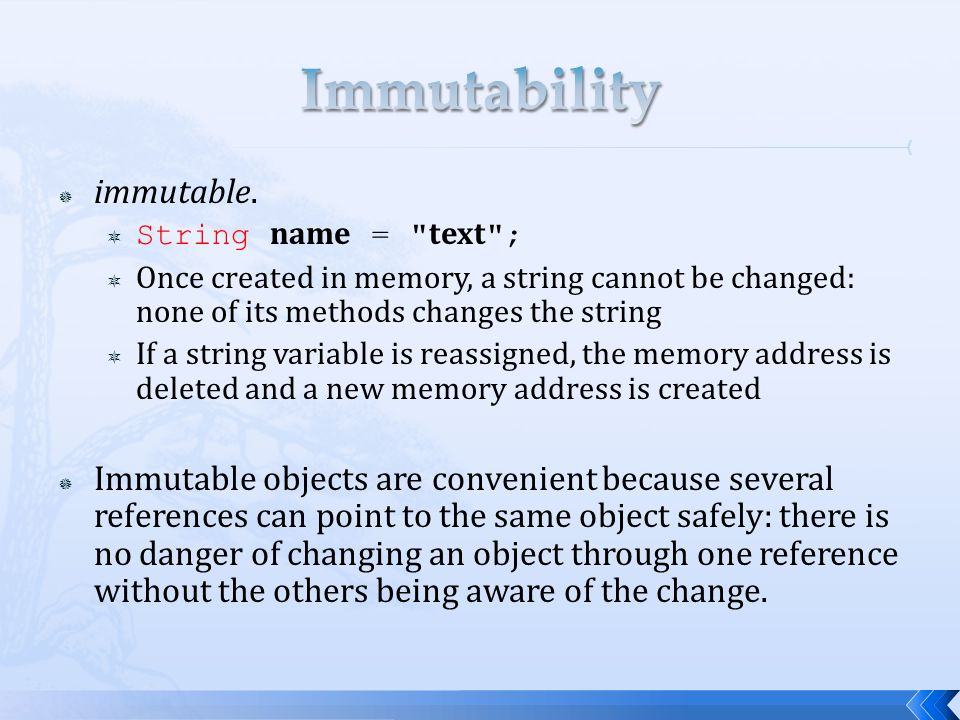Why Are Strings Immutable in Java? Enhancing Code Dependability
Why Are Strings Immutable in Java? Enhancing Code Dependability
Blog Article
What Is Unalterable Strings and How It Works
In the realm of shows, understanding the concept of unalterable strings is paramount for producing secure and robust applications. Unalterable strings describe strings that can not be modified after they are created, guaranteeing data honesty and predictability within the code. This fundamental principle plays a vital duty in numerous programming languages and offers a distinct technique to handling data. By exploring the complexities of exactly how immutable strings function, one can uncover a world of benefits and possibilities that can boost the high quality and efficiency of software program advancement.
The Basics of Unalterable Strings
Unalterable strings, as a fundamental idea in shows, are character series that can not be altered once they are developed. This indicates that as soon as a string is appointed a worth, that value can not be altered. In languages like Python and Java, strings are immutable objects, bring about various effects in regards to memory monitoring and information honesty.
One of the key advantages of unalterable strings is that they give a sense of safety and security in data adjustment. Considering that the content of an unalterable string can not be modified, it ensures that the original information stays intact, reducing the risk of unexpected changes during program execution (Why are strings immutable in Java?). This property additionally streamlines debugging procedures, as developers can trust that once a string is specified, its worth will certainly not be inadvertently altered
In addition, immutable strings promote efficient memory use. When a brand-new string is created based upon an existing one, instead than changing the initial string, the new value is stored individually. This technique boosts performance by minimizing memory fragmentation and simplifying memory appropriation processes. In general, understanding the basics of immutable strings is critical for grasping programs ideas and optimizing code performance.
Advantages of Unalterable Strings
Building upon the safety and efficiency benefits of immutable strings, their benefits expand to boosting code integrity and streamlining concurrent shows tasks. By being unalterable, strings can not be changed after production, which gets rid of the threat of unplanned changes in the information they store. This inherent immutability makes sure that as soon as a string is developed, its value remains continuous throughout the program's execution, lowering the chances of bugs brought on by unforeseen changes.
Additionally, immutable strings add to code integrity by making it easier to reason concerning the state of a program. Considering that strings can not be changed, designers can rely on that a string will certainly constantly hold the very same value, simplifying debugging and upkeep initiatives. This predictability causes a lot more dependable and secure codebases.

Execution in Shows Languages
Within various shows languages, the consolidation of unalterable strings is a fundamental element that impacts how data find out this here is handled and manipulated within code structures. The execution of immutable strings differs across different programs languages, with each language providing its own systems to sustain this principle.

On the other hand, languages like C and C++ do not have built-in assistance for immutable strings. Designers in these languages must manually apply immutability by imposing policies within their code to stop straight modifications to string items.
Ideal Practices for Dealing With Unalterable Strings
When handling immutable strings in programming languages like Java and Python, sticking to best methods makes sure effective and protected information adjustment. Among the essential finest practices is to make use of StringBuilder or StringBuffer as opposed to directly controling strings, specifically when managing extensive concatenation operations. These classes give mutable alternatives for string adjustment, aiding to prevent unneeded memory allowances and boosting performance.
Additionally, when functioning with sensitive information such as passwords or API keys, it is crucial to stay clear of keeping them as ordinary message in unalterable strings. Using safe storage systems like char varieties or specialized collections for handling delicate details assists mitigate safety risks associated with immutable strings.
Real-world Applications and Instances
Checking out useful applications of immutable strings in numerous industries reveals their considerable effect on information stability and system integrity. In the health care sector, unalterable strings play a crucial role in ensuring the security and confidentiality of client data. By preventing unauthorized adjustments to delicate details such as medical documents and prescriptions, immutable strings assist maintain compliance with strict privacy regulations like HIPAA.
Monetary institutions additionally gain from the immutable nature of strings to boost the protection of client information and purchase documents. Unalterable strings assist protect against fraudulence and unapproved alterations to economic info, offering a robust defense against cyber dangers and making check this certain the trust fund and self-confidence of customers.

Final Thought
Finally, great site immutable strings are taken care of and unchangeable sequences of characters that offer advantages such as thread safety and enhanced efficiency in programs. They are carried out in various shows languages to make sure data honesty and security. Ideal techniques for collaborating with immutable strings consist of preventing direct adjustments and utilizing methods that return brand-new string objects. Real-world applications of immutable strings consist of data security, caching, and string manipulation tasks.
Unalterable strings refer to strings that can not be changed after they are produced, making certain information stability and predictability within the code. When a new string is developed based on an existing one, rather than modifying the initial string, the new worth is kept individually.In languages like Java and Python, strings are unalterable by default, meaning that as soon as a string object is created, its value can not be transformed - Why are strings immutable in Java?. Ideal techniques for working with immutable strings consist of preventing straight modifications and using techniques that return brand-new string items. Real-world applications of unalterable strings include data encryption, caching, and string manipulation jobs
Report this page